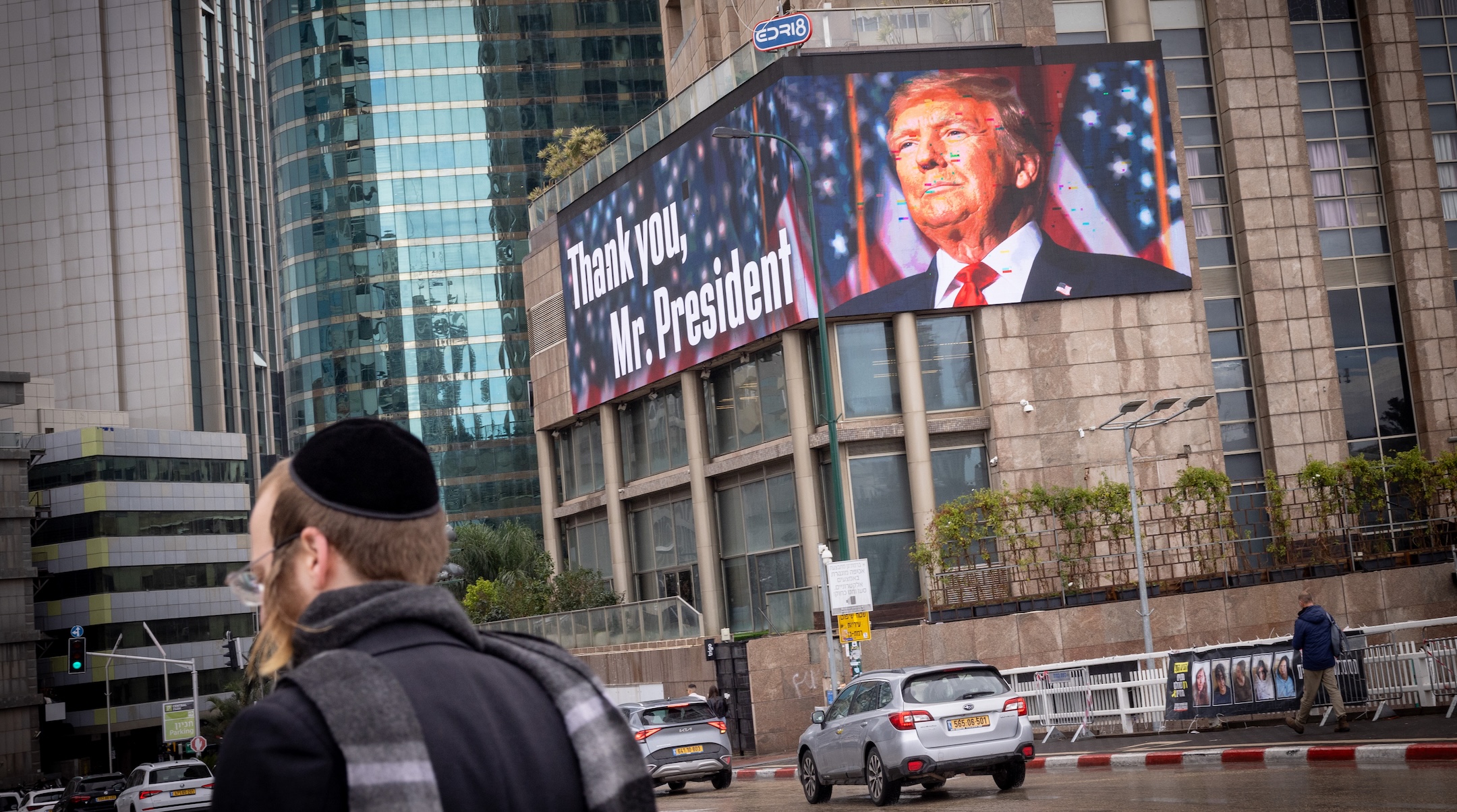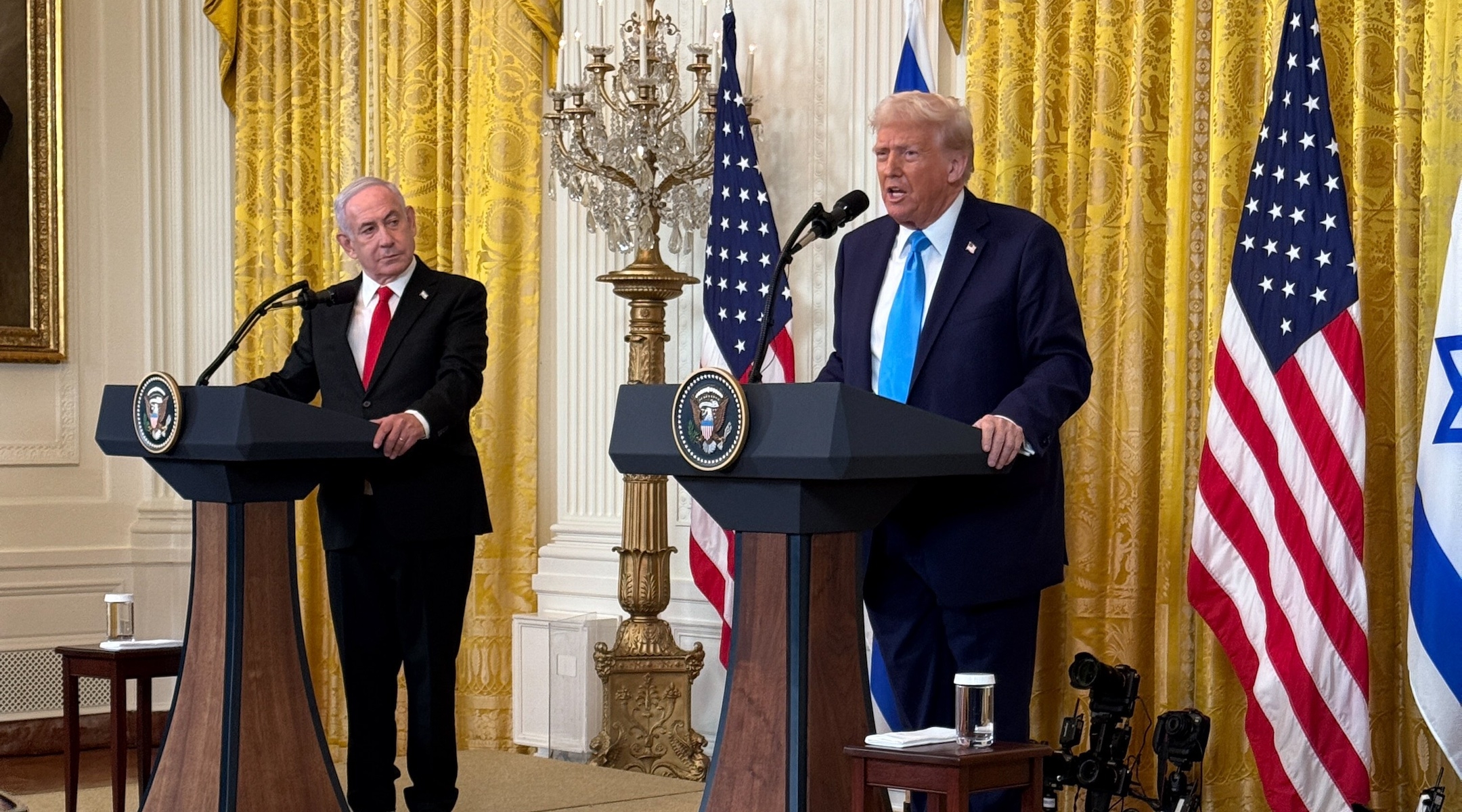For Brooklyn-based Jewish musician Rafael Cohen, life has been a series of journeys: across continents, across musical genres and across the spiritual divide.
The 48-year-old was born and raised in Mexico City before moving to Washington, D.C. with his parents at age 10. There, he played in a series of local punk bands before moving to New York City in 2003, where he joined the Brooklyn-based indie band !!! — pronounced “chk-chk-chk” — an outfit that’s known for their sweaty, upbeat dance rock and high-energy live performances.
These days, Cohen — who plays bass and other instruments in !!! — is also focused on his genre-bending solo project, Las Palabras (“The Words” in Spanish), which has an entirely different sound and is inspired by his Latin American Jewish roots.
His first Las Palabras album, released in 2020, featured mostly acoustic guitar, Spanish-language lyrics and a heavy bachata influence — all firsts for Cohen. On Friday, Las Palabras will release its second album, titled “Fe” (or “Faith” in Spanish), which adds some electronic layers to the sound without losing the Latin American-influenced acoustic guitar at the base of it all.
With “Fe” — much of which was recorded in his Williamsburg, Brooklyn apartment, which he shares with his wife, Molly, and kids Lupe, 12, and Ramon, 6 — Cohen also wrestles with his Jewishness for the first time. He sings on the title track: “I have faith/And I will continue/I don’t really know why/And that’s why it’s faith.”
Ahead of the album’s release on Friday, we spoke with Cohen about his family’s journey from Israel to Guatemala to Mexico to the United States, his spiritual path and the differences between singing in Spanish and English.
This interview was condensed and lightly edited for clarity.
What inspired Las Palabras?
My old band, El Guapo, we were on our last tour [circa 2007], and the band was kind of falling apart, and I found this old nylon string guitar, a little travel one, for $100 or something, just to have in the van. I had actually learned how to play on a nylon string guitar, because my parents had one. I just started to write these little bits of songs, then I decided to start singing in Spanish, which was my first language. I had never written songs in Spanish before, but the music kind of lent itself to it.
So I started to write these little songs and the band broke up, and I did different things with my life. And then I just kept kind of at it. I was super into Brazilian music. The music I’d made was always more electronic and amplified, less folky or whatever you want to call it. So it was kind of a new place for me to go.
You grew up Jewish in Mexico City. What was that like?
I mean, now we have a Jewish president in Mexico! We made it all the way.
Support the New York Jewish Week
Our nonprofit newsroom depends on readers like you. Make a donation now to support independent Jewish journalism in New York.
I was born in Mexico, but my parents are from Guatemala, so really my Jewish family experiences were with the Guatemala Jewish community, which is tiny — it’s 1,500 people, basically. I wasn’t raised in a very religious way at all, but just from the fact of being in contact with such a close-knit Sephardic Jewish community in Guatemala, it was always very present.
Did you visit the Jewish community in Guatemala often while growing up?
Yeah, that’s where I had my bar mitzvah. That’s where my grandparents were, that’s where everyone was. My parents were secular, so the only point for me having a bar mitzvah was to show it, to make sure the grandparents saw it.
Was there a Guatemalan Jewish community in Mexico?
There’s no real community of Guatemalan Jews anywhere except Guatemala and maybe Miami. My grandmother had eight siblings, so it’s a big crew. Then my grandfather, he lived in a very small town in Guatemala and was the only Jewish person in a town of about 50,000 people. So my dad grew up in very isolated parts of the Diaspora.
And you might ask: “So did you ever face any antisemitism?” He’d say, “No, I get along with everyone. I mean, during Easter Week, they’ll stone the house. But that’s about it.”
Wow, that brings me back to “Borat.”
The funny thing is, the rest of the year, he got along with all these people fine, you know? Later, there was a big move of evangelical Christians there who are into Hebrew and Israel. And they’d come and hang out with [my grandfather] and ask him about Hebrew, because he was from Jerusalem. They’d ask, “What’s the Wailing Wall like?” and stuff like that.
What happened when you moved to the United States? Did your connection to your Judaism change?
So I studied [Judaism] in college; I went to Wesleyan. It wasn’t religious, it was more academic. But I definitely wrestled with that in a way, I think even to the extent where my parents were like, “Why are you getting into this?”
My grandparents were very religious. My parents had gone to college and were very secular. And so I tried to figure out where I fit into the whole thing. For my parents, Judaism was this kind of uneducated folk tradition that they were trying to get out of. But I didn’t have that same connection to it — I was like, “Well, what’s this?” So I actually majored in religion in college, and I wrote a long oral history of my maternal grandmother and my paternal grandfather, just to try to kind of understand it all.
So I’ve always had these kinds of questions swirling around about what faith is and my relationship to that stuff. In some ways, I feel like that’s why I’ve made this record. And in some ways, if I’m being honest with you, that’s why it’s in Spanish, because I don’t know if I’d be able to write these songs in English. It was almost like, let me look at some things that I’m not entirely sure of and work through them because of the different language.
Support the New York Jewish Week
Our nonprofit newsroom depends on readers like you. Make a donation now to support independent Jewish journalism in New York.
You can be a little more vulnerable singing in Spanish.
Yeah. My wife, for example, she’s very intensely atheist. The first song of the new record is called “Escudo y Espaya,” which means “Sword and Shield.” And it’s about this combative resistance to the idea of anything else [like God] actually existing. It says, “Put down your sword and shield, try to have a little bit of faith.” I’m kind of directing that to myself, but also to her. I find myself in many conversations being like, “Oh… I don’t know, I don’t know.”
Have you incorporated Judaism into your life in tangible ways since making this album?
There’s not much, honestly, and that’s something that I think about a lot, particularly with my kids. My sister’s kids had bar and bat mitzvahs. I don’t know if my kids will, you know, and part of it is I haven’t found a community that I felt comfortable in. But I also haven’t sought it out enough.
Sounds like you’re on a path.
I’m still wondering, yeah. I haven’t figured it out yet.
Las Palabras will play a concert celebrating the new album “Fe” at Union Pool (484 Union Ave.) in Williamsburg, Brooklyn on Dec. 12.
Jewish stories matter, and so does your support.









 English (US) ·
English (US) ·